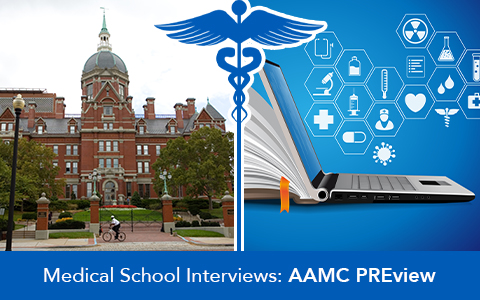 This is part 2 of our 5-part series on medical school interviews. For information on the other posts in this series, see our overview post here.
This is part 2 of our 5-part series on medical school interviews. For information on the other posts in this series, see our overview post here.
In recent years, some medical schools have begun requesting or requiring assessments of personality characteristics to accompany candidate’s application materials, before selecting prospective students to advance in the admissions process towards interviews. Most such med schools ask applicants to complete one or all of the three-part Altus Suite of assessments, which we described in a previous post. A smaller but growing number of medical schools require or recommend the AAMC PREview™ Professional Readiness Exam, formerly known as the AAMC Situational Judgment Test, which is somewhat similar to the Altus Suite’s Casper test in aims and structure.
Ask about our Med School Candidacy Evaluation Package: Find out if you’re ready to apply!
Overview
The PREview Exam is designed to measure respondents’ “knowledge of effective and ineffective behaviors across eight core pre-professional competencies for entering medical students,” namely Service Orientation, Social Skills, Cultural Competence, Teamwork, Ethical Responsibility to Self and Others, Resilience and Adaptability, Reliability and Dependability, and Capacity for Improvement. For more details on these competencies, see the AAMC’s Summary of Core Competencies for Entering Medical Students here. Note that these skills constitute all the Pre-Professional Competencies identified by the AAMC except for Oral Communication (since it’s a written test) and omit the Thinking and Reasoning Competencies and Science Competencies (presumably because they are captured in the MCAT). The test seeks “to look beyond academic metrics to assess and evaluate personal competencies,” as the AAMC puts it. “When combined with other elements of the admissions process, the PREview exam provides a more complete picture of applicants and helps schools identify applicants who demonstrate these core competencies.”
Structure
Like Casper, you’ll take the AAMC PREview test on your own laptop or home computer, and you will be presented with a series of hypothetical text-based scenarios. Unlike Casper, there will be no scenarios presented via video; you’ll respond to all scenarios from the point of view of a medical student; and the test will be proctored live (yes, by an actual human being!).
Also, while Casper asks respondents to come up with original answers to questions about each scenario, PREview offers a series of behavioral responses to each scenario and asks test-takers to rate the effectiveness of each on a four-point scale. Here’s an example from the AAMC site:
You are pursuing a two-week volunteer opportunity at a well-regarded local clinic. When you receive your course schedule, you realize the volunteer opportunity would conflict with your weekly required lab. This is the only time that the lab is offered this semester, so you are not able to make up the lab. Participation in the lab will count toward your grade.
After reading a scenario like this one, you’ll be given a series of possible responses to the situation—like “Skip your lab for two weeks to attend the volunteer opportunity” and “Ask your lab instructor to identify a solution that will allow you to attend both”—and asked to rate the effectiveness of each.
Scoring & Timing
Your ratings will be compared to those of medical educators; an exact match gets full credit, while a close match gets partial credit. Your total score on the exam will range from 1 to 9.
The AAMC PREview test is administered less frequently than Casper; the 2022 testing calendar offers ten testing dates from June through September. The test costs $100 and takes 75 minutes to complete.
Our Tips
To prepare for the test, familiarize yourself with the log-in procedure (see this helpful video and the AAMC’s own Examinee Preparation Guide) as well as the test format (see the AAMC’s sample questions). Take a practice test, which the AAMC offers here.
Beyond that, there isn’t any “studying” you can do in the traditional sense; this test aims to assess your intuition and judgment, not your knowledge. So relax, get a good night’s sleep, and do whatever else you can to enable clear thinking on test day!
Applying to medical school is a complicated process, and interviews are no exception. We encourage you to read through the rest of our blog posts on med school interviews. Feel free to contact Collegiate Gateway if you would like guidance on any aspect of the med school application and admissions process. As always, we’re happy to help!
